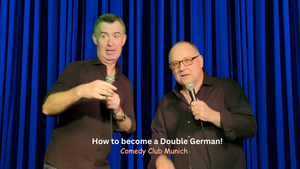Anna McCarthy: INVISIBLE BORDERS
In the organizer's words:
The idea of being able to move around without border controls has long characterized Europe, especially with the Schengen Agreement of the 1980s. Border controls are now part of everyday life at several German borders. Since 2015, the focus of controls has been on entry from Austria to Germany, following the arrival of thousands of refugees in Munich that year. In the debates surrounding this, there have also been calls to exclude the Oktoberfest period from the influx of refugees.
The "invisible borders" project looks at German migration policy from 2015 to the present day in relation to border controls, fears, resentment and racism. In cooperation with the Offen campaign, an alliance of 200 initiatives for a society based on solidarity, Anna McCarthy is developing a performance that deals with these issues both playfully and in terms of content. The action will take place on the day before the start of the Oktoberfest, with a rally and music and dance performance below the Hackerbrücke and a demonstration procession with a final rally in Bavariapark at an installation in the form of border architecture.
- Location: Start Hackerbrücke → Closing rally Bavariapark
- Date: September 18, 6-10 p.m.
- Format: Performance + demonstration march + installation
Public Art Munich - Annuale 2025 "Zero hour? How we became what we are."
6 temporary art projects in public space JUL - OKT 25
As part of a city-wide program on the post-war period in Munich entitled "Zero Hour? How we became what we are." focuses on questions that are still relevant today: What is the relationship between democracy, immigration and memory? How can authoritarian structures be overcome and a democratic society created? After the end of the war in 1945, Munich was a city on the move. Six temporary projects by Munich artists from Annuale 2025 address the changes and continuing structures of urban society after 1945 and comment on them artistically with regard to democracy, culture(s) of remembrance, repression and ideology.
Free admission to all art projects. Current information on locations and running times here.















